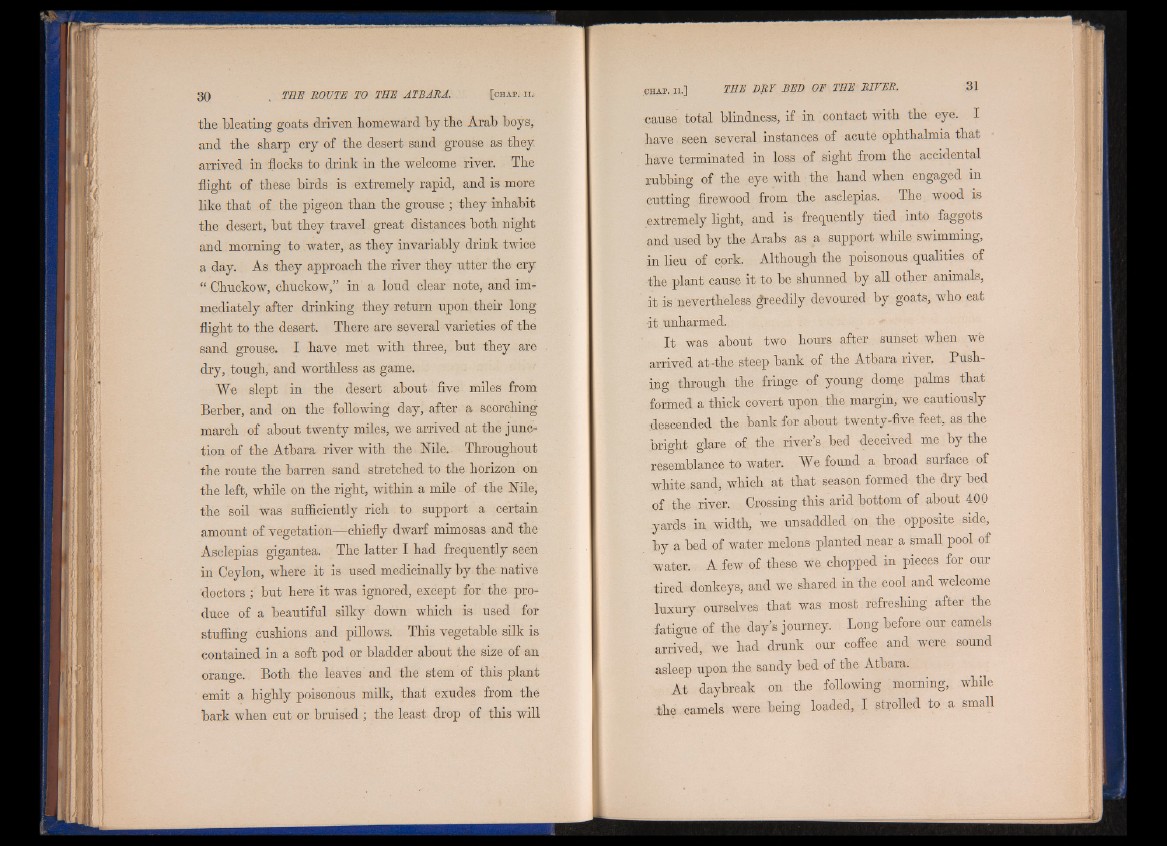
the bleating goats driven homeward by the Arab boys,
and the sharp cry of the desert sand grouse as they
arrived in flocks to drink in the welcome river. The
flight of these birds is extremely rapid, and is more
like that of the pigeon than the grouse ; they inhabit
the desert, but they travel great distances both night
and morning to water, as they invariably drink twice
a day. As they approach the river they utter the cry
“ Chuckow, chuckow,” in a loud clear note, and immediately
after drinking they return upon their long
flight, to the desert. There are several varieties of the
sand grouse. I have met with three, but they are
dry, tough, and worthless as game.
We slept in the desert about five miles from
Berber, and on the following day, after a scorching
march of about twenty miles, we arrived at the junction
of the Atbara river with the Nile. Throughout
the route the barren sand stretched to the horizon on
the left, while on the right, within a mile of the Nile,
the soil was sufficiently rich to support a certain
amount of vegetation—chiefly dwarf mimosas and the
Asclepias gigantea. The latter I had frequently seen
in Ceylon, where it is used medicinally by the. native
doctors ; but here it was ignored, except for the produce
of a beautiful silky down which is used for
stuffing cushions and pillows. This vegetable silk is
contained in a soft pod or bladder about the size of an
orange. Both the leaves and the stem of this plant
emit a highly poisonous milk, that exudes from the
bark when cut or bruised ; the least drop of this will
cause total blindness, if in contact with the eye. I
have seen several instances of acute ophthalmia that
have terminated in loss of sight from the accidental
rubbing of the eye with the hand when engaged in
cutting firewood from the asclepias. The wood is
extremely light, and is frequently tied into faggots
and used by the Arabs as a support while swimming,
in lieu of cork. Although the poisonous qualities of
the plant cause it to be shunned by all other animals,
it is nevertheless greedily devoured by goats, who eat
■it unharmed.
It was about two hours after sunset when we
arrived at-the steep bank of the Atbara river. Pushing
through the fringe of young dom.e palms that
formed a thick covert upon the margin, we cautiously
descended the bank for about twenty-five feet, as the
bright glare of the rivers bed deceived me by the
resemblance to water. We found a broad surface of
white sand, which at that season formed the dry bed
of the river. Grossing this arid bottom of about 400
yards in width, we unsaddled on the opposite side,
by a bed of water melons planted near a small pool of
water. A few of these we chopped in pieces for our
tired donkeys, and we shared in the cool and welcome
luxury ourselves that was most refreshing after the
fatigue of the day’s journey. Long before our camels
arrived, we had drunk our coffee and were sound
asleep upon the sandy bed of the Atbara.
At daybreak on the following morning, while
the camels were being loaded, I strolled to a small